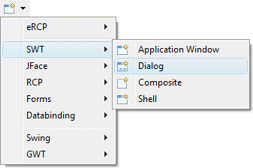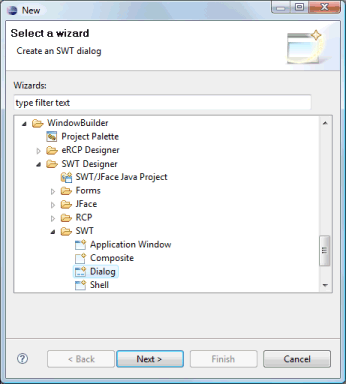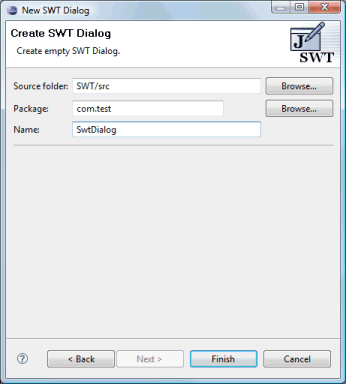 Subclasses of the SWT Dialog class can be
created using the SWT Dialog wizard. The wizard can be
selected from the drop down wizard menu or from the
Eclipse New wizard.
Subclasses of the SWT Dialog class can be
created using the SWT Dialog wizard. The wizard can be
selected from the drop down wizard menu or from the
Eclipse New wizard.
To use the wizard, select the project source folder and package to contain the class. Then enter the class name and hit the Finish button.
The org.eclipse.swt.widgets.Dialog class is the default superclass.


The wizard generates the following code including a open() method.
import
org.eclipse.swt.SWT;
import org.eclipse.swt.widgets.Dialog;
import org.eclipse.swt.widgets.Display;
import org.eclipse.swt.widgets.Shell;public
class SwtDialog extends Dialog {
protected Object result;
protected Shell shell;
public SwtDialog(Shell parent, int style) {
super(parent, style)
}
public SwtDialog(Shell parent) {
this(parent, SWT.NONE)
}
public Object open() {
createContents();
shell.open();
shell.layout();
Display display = getParent().getDisplay();
while (!shell.isDisposed()) {
if (!display.readAndDispatch()) {
display.sleep();
}
}
return result;
}
protected void createContents() {
shell = new Shell(getParent(), SWT.DIALOG_TRIM | SWT.APPLICATION_MODAL);
shell.setSize(450, 300);
shell.setText("SWT Dialog");
}
}
When editing SWT Dialogs, all of the standard SWT layouts, containers, widgets and menus are available. Custom or third party controls may be added via the Choose Component command.